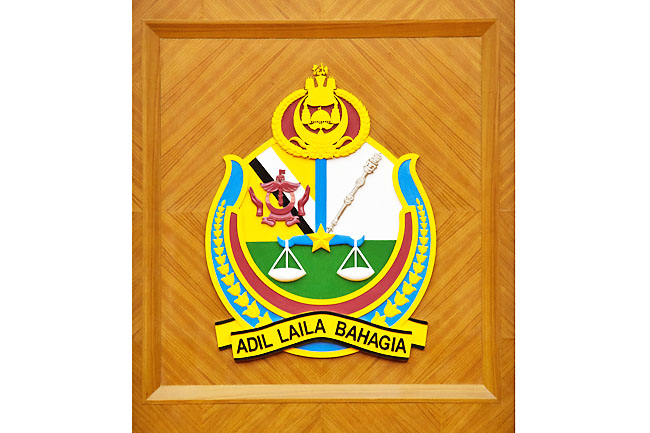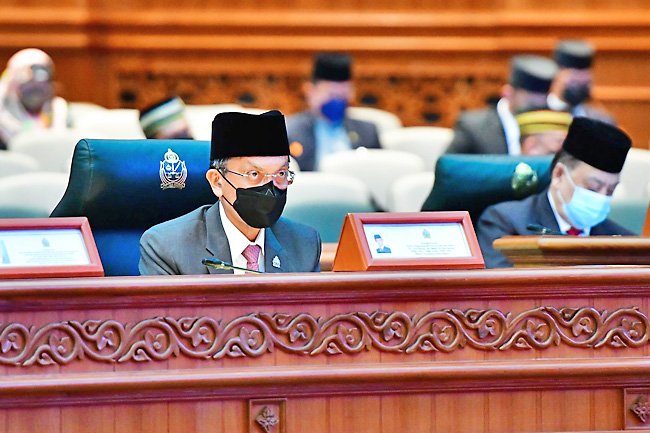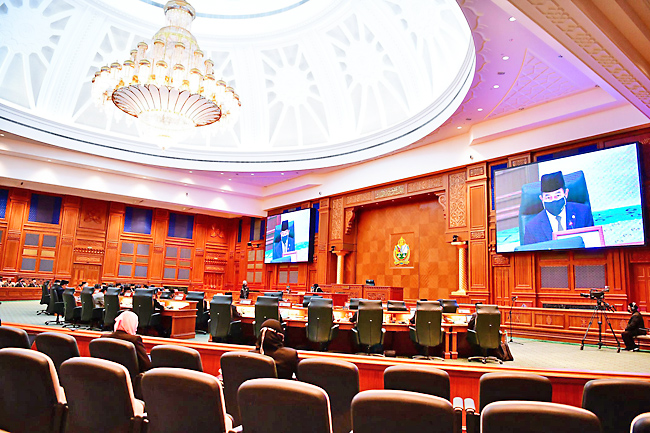Rokiah Mahmud
A BND128,343,070 budget allocated to the Ministry of Home Affairs (MoHA) and the departments under it, was unanimously passed by Legislative Council (LegCo) members for financial year 2022-2023 during the fourth day of the 18th Legislative Council session yesterday.
Minister of Home Affairs Yang Berhormat Pehin Orang Kaya Seri Kerna Dato Seri Setia (Dr) Haji Awang Abu Bakar bin Haji Apong, in his opening speech, deliberated that in line with this year’s financial theme, ‘Strengthening Public Well-being Towards A More Resilient Socio-Economy’, the ministry will facilitate the allocated budget by focussing on initiative planning and implementation continuously.
The minister said with the country and the world still facing the COVID-19 pandemic, it drives the ministry to make changes in initiatives, policies, acts and legislations to face challenges derived from the pandemic. The changes include carrying out consistent approaches and continuously facilitating the use of information technology to manage the ministry and departments under it to provide public services by upholding the country’s aspiration towards a Smart Nation and Industrial Revolution 4.0.
The minister shared that the ministry has conducted several initiatives based on the theme and main focus of the financial year.
“For this, to preserve public safety and well-being, the Labour Department and Immigration and National Registration Department (INRD) will improve in providing various services.



“The INRD is in its final phase of implementing the Immigration and National Registration System (INRS), aimed at collecting and integrating a more comprehensive personal information of an individual including biometric data,” said Yang Berhormat Pehin Orang Kaya Seri Kerna Dato Seri Setia (Dr) Haji Awang Abu Bakar, adding that it will enable sharing of data information resources among stakeholders in government agencies.
The minister continued, “The Border Control System (BCS) under INRS will commence by April at Brunei International Airport to check visitors via fingerprints and facial recognition.
“The method will assist in tracking demographic record for visitors while tracing unwanted visitors to the country more efficiently. The BCS will be stretched to all control posts phase by phase.”
The minister said the Labour Department and NRID will continue to review and coordinate procedures and regulations from time to time, “including the Employment Order 2009 and Immigration Acts and Regulations by conducting inspections, continuous and consistent enforement either by conducting it alone or with related agencies and with help from the public and grassroots leaders”.
He added, “This ensures the control of foreign nationals or foreign workers’ entry to the country while maintaining and protecting their well-being, and taking action on labour law and immigration violators.”
On the Fire and Rescue Department (FRD) and National Disaster Management Centre (NDMC), Yang Berhormat Pehin Orang Kaya Seri Kerna Dato Seri Setia (Dr) Haji Awang Abu Bakar said both play a role in preparing for an emergency and disaster ready community.
“Steps have been taken to instil the culture of readiness and shaping a resilient community, by supplying logistical needs and carrying out competent community development
programmes continuously.”
The minister said programmes conducted by the FRD have produced 48 individuals that contributed to community service last year. This shows the trained fire volunteers are able to douse fires in their villages before the firefighters’ arrival at the scene.
The FRD also imposed compound fines for various offences under the Fire Safety Order 2012 (FSO 2016) from August 2021. This is hoped to ensure fire prevention and reducing fire-risks will be fully complied while ensuring that premise owners and tenants, especially those in the private sector, comply with the fire safety regulations, he said.
A total of 142 fire incidents have been recorded in 2021, said the minister, including 58 houses with the loss amounting to BND973,000. However, only 2.9 per cent of the houses were protected by insurance.
The minister said while the country is facing threats from COVID-19, the Sultanate also has to deal with natural disasters from climate change including floods, landslides, fallen trees and strong winds.
He added, “Based on the occurrences, we need to enhance readiness and precautions at all times. The NDMC has reviewed and updated the Disaster Management Strategic Policy Framework Draft (DMSPF) and the Brunei Darussalam National Climate Change Policy (BNCCP).
“Among the priorities in formulating the policy are to promote safety, resilience, economic prosperity and environment through the whole-of-nation approach in protecting the well-being of the community through seven main programmes with the objectives in line with the Brunei Vision 2035 target.
“The District Offices have also continuously taken action to strengthen mukim and village institutions, in line with the ministry’s efforts to strengthen solidarity among the community”. Among the efforts, the minister added, include re-zoning mukims and villages in which the project has been carried out such as Kampong Ayer and mukims and villages on land. The re-zoning also has also seen the majority of penghulu mukim and village head designations undergoing the process of being filled.
“For areas needing boundary changes, the matter is still in the coordination process with stakeholder agencies,” said the minister. “The current COVID-19 situation has indirectly affected the planning process to fill penghulu mukim and village head designations. The E-Undi app, launched in October 2, 2021, allows additional voting procedures and the election of penghulu mukim and village head to run smoothly.”
Meanwhile, the ministry has also carried out several initiatives that act as catalysts to further generate socio-economy, said the minister. The municipal boards along with district offices have explored plans to assist and provide platforms for micro, small and medium enterprises (MSMEs) to generate income through entrepreneurship. Plans in providing business places are also currently under request for proposal (RFP) for areas that have been identified, he said.
Economic sectors in mukims and villages have been badly affected due to COVID-19. This is reflected in the One Village One Product’s (1K1P) income, which “has decreased from BND802,260 in 2019 to BND710,172 in 2020, and a further decrease in 2021 to BND556,842”.
Nonetheless, he continued, the 19 entrepreneurs involved in the 1K1P transformation project in 2021, managed to increase their average income by over 106 per cent, indicating that some earned an income of BND5,000 to BND7,000 per month.
“The MoHA is grateful and proud that a number of entrepreneurs have taken a bold approach and turned COVID-19 challenges into opportunities,” said the minister. “The ministry will consistently take steps with strategic partners to further enhance the development of village products in the hopes of penetrating the regional market.”
Yang Berhormat Pehin Orang Kaya Seri Kerna Dato Seri Setia (Dr) Haji Awang Abu Bakar said apart from providing infrastructure to catalyse the socio-economy, the ministry will also focus on high building tax arrears that have increased from year to year.
It will implement more effective actions in reducing and avoiding arrears. In addition to continuing the initiatives implemented previously, the ministry will strive to improve and further action to make claims through court procedures.
The ministry is also in discussions with other government agencies to require the payment of building tax in advance before certain types of applications can be approved.
In the meantime, the ministry is in the process of implementing the Municipal Property Database Project (EP-TAX) under the 11th National Development Plan to establish a database system for information on properties in municipal areas and enable property owners to pay building tax online, said the minister.
“Based on the provisions and initiatives that have been presented, and taking into account the ever-changing environment in line with current needs and requirements, the ministry will always strive to provide services to improve the quality of life and generate a developed and empowered economy that can be enjoyed by current and future generations in further realising the country’s goals, especially in achieving Brunei Vision 2035,” the minister said.



















































